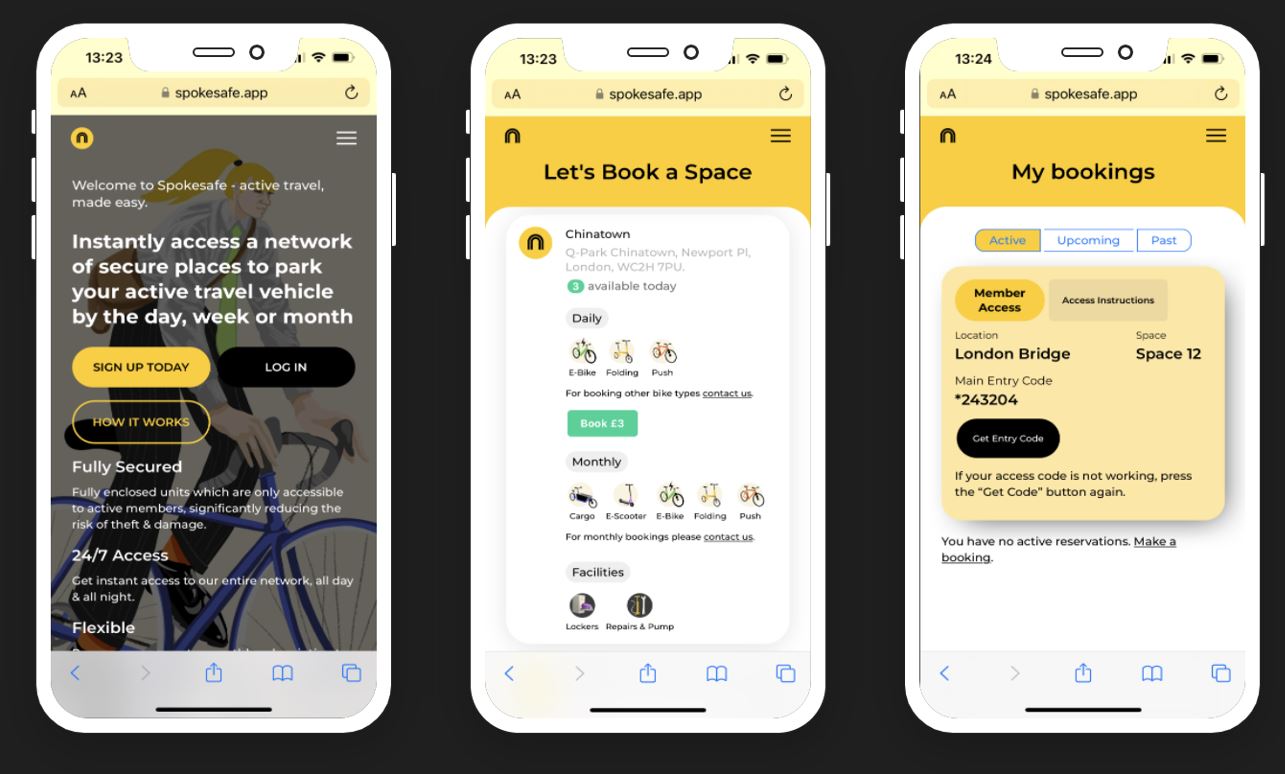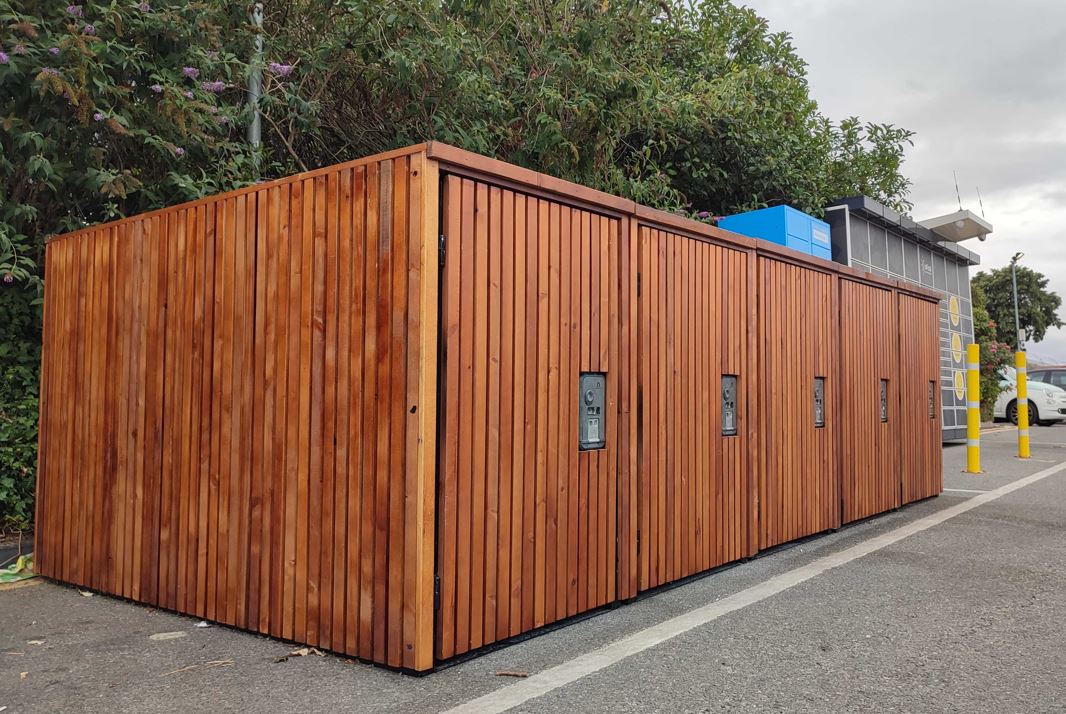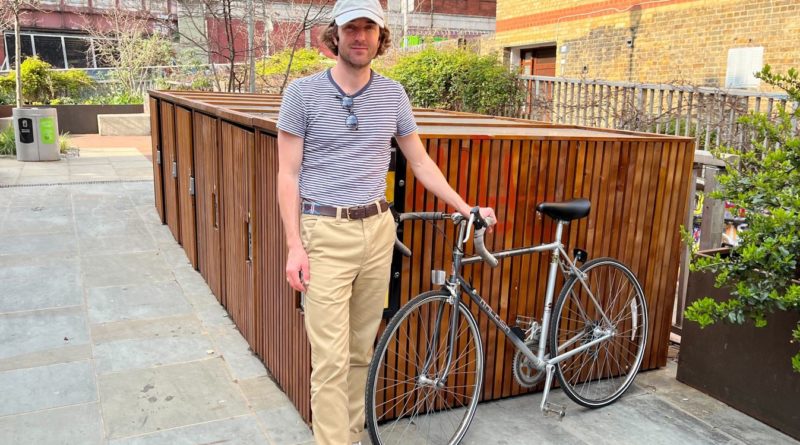Can providing cycle commuter convenience make a viable business?
Can making the commuter journey more secure and convenient form part of a chargeable service and one that is viable in business terms? Laura Laker speaks to Spokesafe to find out…
Did I just hear the term ‘coworking for cycle parking?’ It seems so, as I stand with the founder of Spokesafe, Max Wilson, underneath a busy London Bridge railway line in a concrete lined space filled with empty near-vertical bike racks and Sheffield stands. Founded in March 2019, Spokesafe started repurposing car parking space in central London and turning it over to secure cycle parking, leased to businesses for staff use.
However, within a year city centre parking demand fell off a cliff as Covid lockdowns kept workers at home. Luckily for Wilson those contracts had some time to run, but something clearly needed to change. Emails started arriving from individuals requesting secure bike parking on a pay-as-you go basis, emails he replied to one by one, and things grew from there. So grew the ‘coworking for cycle parking’ business.
I meet Wilson outside London Bridge station for a sneak peek at their newest site. He looks a little like a character from a Wes Anderson movie, cream slacks and a knitted tank top, and strawberry blonde ringlets poking out from under a baseball cap. He knows his stuff though. The site we’re visiting is hidden behind public bike parking under a railway track near the entrance to London Bridge. It’s a step-free stone’s throw from the Shard and the News International offices. The 1,000 square foot site holds around 70 cycle parking spaces, including well-spaced Sheffield stands for cargo cycles, and rows of compact upright cycle stands.
“In the beginning we had about six months’ worth of cash to run the thing with investment from my mum and Godparents,” he says. Now they have investors, like any startup, and will likely be looking for more soon, to expand the business.
 Spokesafe uses a combination of Network Rail, Transport for London, council and commercial land. To its original sites in Q-Park car parks in Oxford Circus, Chinatown and Soho, Spokesafe manages a shopping centre space in Derby. As well as a growing number of central London locations, several more are in the pipeline, including in Colchester city centre, Poole and Newport. Spokesafe is also managing a Transport for London pilot turning car parking space outside six stations in zones 2 and 3 into cycle parking for the commuter, including Leytonstone, Woodford, North Greenwich and East Finchley.
Spokesafe uses a combination of Network Rail, Transport for London, council and commercial land. To its original sites in Q-Park car parks in Oxford Circus, Chinatown and Soho, Spokesafe manages a shopping centre space in Derby. As well as a growing number of central London locations, several more are in the pipeline, including in Colchester city centre, Poole and Newport. Spokesafe is also managing a Transport for London pilot turning car parking space outside six stations in zones 2 and 3 into cycle parking for the commuter, including Leytonstone, Woodford, North Greenwich and East Finchley.
Wilson says the company operates like Just Park does for vehicle parking, with Spokesafe taking a percentage of fees and the landowner receiving the rest.
“We do everything from marketing to providing technology, payment processing, to a 24-hour customer service hotline, so when you call up it will be me or a colleague answering the phone,” he says. Wilson believes it’s a win-win, making revenue out of previously unused space.
With a background as a commercial property agent, Wilson isn’t the first person to think of repurposing urban space for cycle parking. Bike-Drop operated on a similar basis, during the pandemic.
Wilson says: “They were taking retail units in Central London. The money you would take you couldn’t even pay business rates, it was never going to be a viable business. They were charging around £6 a day, too, which is too much.”
“That’s why we operate in car parks. In shopping centres sometimes the landlord has got vacant space and he’s getting money from the council for it [bike parking].”
In Spokesafe’s Derby site the council dropped the rateable value of a retail unit allowing the landlord to convert to cycle parking. “It’s a good example of how the public and private sector can work together. If there is cycle parking it’s a great facility to have as a part of the shopping centre,” says Wilson. In Colchester the council is using the Spokesafe space to store shared cargo cycles local businesses can use for deliveries.
With 70-odd spaces the London Bridge site will likely generate £42,000-£43,000 a year, at a rate of £50 a month, or £1.66 a day, per space. In outer London and elsewhere, rates are lower. There’s more volatility in the pay as you go custom but the charge is almost double. They also took over management of an existing site in Finsbury Park in North London, and are in the process of changing from key card to app-based access.

“For car parking in central London by contrast it’s £50 a day,” says Wilson. “It’s some of the cheapest real estate in London. With the Congestion Charge and ULEZ people are driving in less so these car parks that were big money spinners all of a sudden are at 60% occupancy, so local car park operators are starting to look at alternative uses. Now when you go into many of them you will see things like self-storage.”
It’s not just the absence of motor vehicles, it’s cycling as a growing civic investment area – albeit one that’s still misunderstood.
“One of the problems… is that cycling is often viewed as a non-economic activity – which is wrong,” says Wilson.
“It’s about how do we get people back into the city centre, to [get around in a way that makes them] healthy and happy, and I think cycling has a huge part to play in that – so I think infrastructure that can encourage people to cycle is a good thing.”
He calls the units “active travel facilities”. Although Spokesafe built the innards of some of its London sites – even using a cargo-biking electrician at the Chinatown site – with the capability to act as project managers, they prefer to simply run operations. “We know the rack and door providers, and the CCTV providers. We don’t make money out of that, but we are happy to work with them.”
At London Bridge the sliding metal grille gate and almost all of the cycle commuter parking was already in place, they simply added a security door and keypad, and the cargo bike parking. They’ve signed up the first cargo bike customer – a zero emission delivery company – and are expecting more delivery companies to follow suit. At locations that aren’t underneath railway tracks there’s also lockers and eBike charging.
This year the company launched a web app, now handling 98% of pay as you go custom. “Whether we were building spaces ourselves or not, we knew we needed the technology. We had to develop a system that allows it to run 24/7. Covid forced our hand because it made us do it quicker”.
The app gives them useful data about who is using which spaces when, to help them understand and manage demand.
Users access Spokesafe sites via a code from the web app, which they input into a battery-powered keypad – which doesn’t need Wi-Fi or external power. Monthly and corporate users, the latter still 60% of their business, sign up by email.
The company isn’t yet financially sustainable – it’s still in start-up mode – but the individual parking locations are; it’s just a matter of bringing enough sites online to support the technology and growing team, says Wilson.
“We have to think about, if we want these things to grow and people to invest, we have to make a loss [initially] so that these businesses can stand on their own feet and contribute to society.”
Wilson expects to recruit more staff imminently, and to develop further services like daily insurance cover and repairs carried out while you’re parked.
“We do things we think are good for the customers,” he says. “Focused on managing these active travel facilities, we will continue to do more and more and more of these. We are constantly speaking to new people.”



